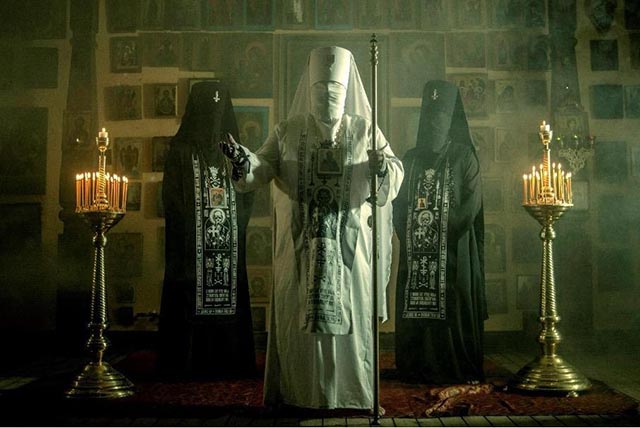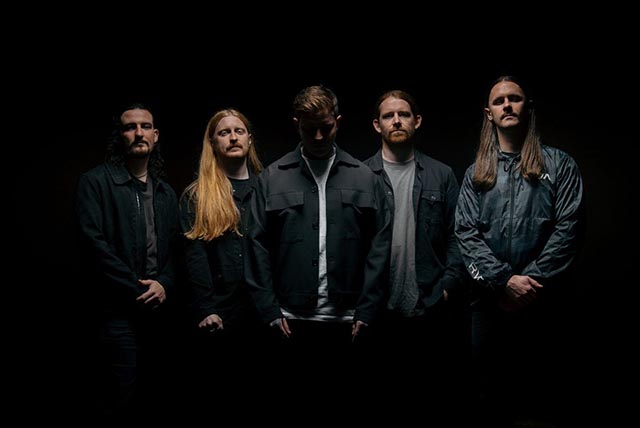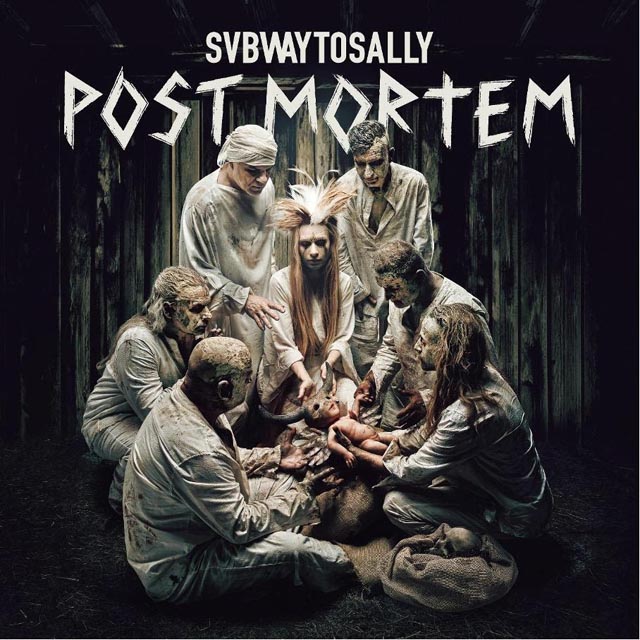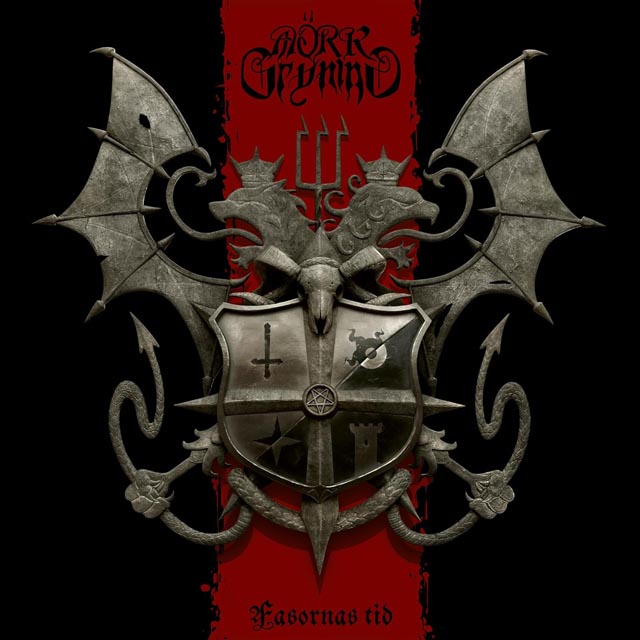
screengrab from antifa video
In late September, Montreal’s respected underground black metal festival Messe des Morts (MDM) announced that the Polish Pagan black metal band Graveland would appear at this years’ event. The band, who is touring for the first time in their twenty five year history, is led by Rob “Darken” Fudali, a man who in the past has made statements affiliating himself with Nazism. The choice was a controversial one, as Fudali has a reputation of being one of the most unrepentant extreme right-wingers in the metal community.
Graveland was set to perform on the last night of the festival (November 26th). The events that followed have been misrepresented by both the mainstream media and the ANTIFA (Anti-Fascist) protesters who were eventually successful in their goal of having the show shut down. On the one hand the media seems hesitant to investigate the incident too deeply, releasing skimpy reports that barely touch on what occurred. Unfortunately this is not too surprising as counter-cultural events are often laughingly held at arms’ length by mainstream outlets and their writers.
On the other hand the ANTIFA is not helping fight this disinformation, as they are still referring to the festival online as a “Racist Metal Concert.” Given the multi-cultural audience in attendance, which included visible minorities and Jews, this is either a deliberate distortion of the facts, or the result of a lack of investigation into the festival. Even though choosing a band like Graveland is bound to cause controversy, to call MDM a racist or Nazi event is stretching things to say the least.
The diverse crowd wasn’t enough to stop the ANTIFA protesters from throwing smoke bombs at the concert-goers lined up outside the Théâtre Plaza, and also inside a nearby McDonald’s restaurant where some had taken shelter. I have also read accounts of protesters attacking attendees outside of the venue and in the Metro (subway) system. These protesters apparently displayed an alarming lack of knowledge about the bands they were supposed to be against, as they seemed to target people who were showing off any of kind of black metal logo, regardless of the band or the person wearing it. As well there was a fire alarm pulled at a nearby hotel where many fans and apparently some of the bands were staying, forcing people (many of whom had nothing to do with the concert at all) out into the cold night.
There are a few questions that immediately arise from this. The first whether the actions of the protesters were appropriate. The answer is unfortunately an easy one. ANTIFA was there to protest against Nazism, an ideology that advocates murder. That in of itself is protest-worthy, but rather than peacefully congregate, they actively used violence against those who wanted to attend, which included minorities. Committing violent acts against minorities and calling them Nazis in order to protest against Nazism reeks of hypocrisy. Furthermore, these actions serve to alienate potential allies that may not have known about Fudali’s presence in the country and would have been sympathetic to their cause, as well as emboldening other extreme right-wingers. ANTIFA’s actions do not represent progress, but a giant step back.
The next question is whether Fudali should have been allowed into Canada in the first place. It’s my belief that anyone who promotes Nazism is advocating murder, and as such their presence does have the potential to incite others, which I feel is a violation of Canadian hate speech laws (Incidentally, ANTIFA could have petitioned immigration officials to stop Fudali from entering the country but instead made an advanced plan online to disrupt the event).
So why was he let in? First of all, I believe that as a metal musician, he and his music are simply not famous enough to warrant the attention. He’s not a well-known rapper with violent lyrics like Eminem, who in 2000 drew the attention of then-Ontario Attorney General Jim Flaherty (he would go on to server as Minister of Finance for eight years under Conservative Prime Minister Stephen Harper). Eminem was touring behind The Marshall Mathers LP, that features the infamous song “Kim” in which the rapper pretends to murder his ex-wife. Flaherty felt that the lyrics are a violation of Canada’s hate speech laws, and he himself urged officials to bar Eminem from the country. Ultimately he was let in and the show went on, with the publicity only helping to heighten his controversial image. As far as provocative lyrical content goes Fudali is a saint next to Eminem.
He’s not a famous Nazi either, but that wouldn’t have necessarily made much of a difference. Take for example Ernst Zündel, the Holocaust-denying publisher and author of such gems as Did Six Million Really Die? He was tried in 1991 for spreading false news. But the Supreme Court of Canada found the law to be unconstitutional, as his opinions were regarded as non-violent in nature, and silencing him would be a violation of his right to freedom of speech (he’s since served a prison term in his native country of Germany after be deported). For me, Fudali’s endorsement of this violent ideology is what legally separates him from someone like Zündel, but he’s still not well-known enough to garner the same attention.

Photo: Last.fm
Many in the metal community would also argue that it is essential to separate the artist from their art, and that they will listen to any music they enjoy no matter how terrible the person behind it is, be they racist, homophobe, or a convicted murderer. I do not share this view, as I find that art can be linked to the artist if that person is outspoken about their extreme beliefs (for example I have trouble listening to Megadeth without thinking about the time frontman Dave Mustaine said that Barack Obama was staging mass shootings in the U.S. to push gun control), but I do respect it.
However the key word that I think keeps getting missed in this point of view is “listen.” I respect the view that the act of listening to a Nazi artist in of itself can be acceptable. Should we condemn decades of film students for studying the works of Leni Riefenstahl (Hitler’s personal filmmaker), or anyone who read Mein Kampf in high school? Of course not. This separation is possible because thanks to technology, it is extremely easy to study an artist without actually supporting them.
A few years back I had the chance to speak to U.K. author, sociologist, and expert on all things metal and Jewish, Keith Kahn-Harris. When asked about the separation between the artist and their art, he had this to say: “This is a question that people have been raising for hundreds of years, long before metal even existed. One of the major examples of this is (German composer Richard) Wagner, who produced incredible music in the 19th Century but himself was a really anti-Semitic, really unpleasant guy. Often artists can be really unpleasant. You can separate them to an extent. However having said all of that, you don’t want to line (Burzum founder and Neo-Nazi) Varg Vikernes’ pockets. So the sort-of mealy-mouthed compromise that I do is that I illegally download all of his stuff. I’ve never paid a penny toward anything that Burzum’s done or bought a t-shirt or anything like that. Nor will I ever. But I cannot deny the fact that as a musician his work is quite extraordinary. I would love it if his work was shit. It’s very easy for me to not play works by (Nazi punk band) Skrewdriver or bands like that because it’s shit, and unless you were a hardcore Nazi, you wouldn’t want to listen to it. But it’s not the case with Burzum, it’s simply too interesting music to ignore. A lot of people listen to Burzum, including Jews like me, fucked up Jews like me (laughs). Including outright Nazis and everything in between. I think most of Burzum’s fans are entirely unconcerned with his politics, which of course is not a good thing either. But just because you listen to Burzum doesn’t mean you should be condemned.”
While you aren’t compromising any values just by listening to a Nazi artist, you are if you financially support them. Their art may not reflect their personal beliefs, but giving them money contributes to their livelihood, and that will allow them more opportunities continue to be outspoken about their endorsement of Nazism.
This often inspires the point that it’s possible that many artists share these beliefs but keep silent, so it’s impossible to know what kind of person I’m supporting in general. My response is that if someone is a bigot, but never publicly expresses those beliefs and just continues to create art that doesn’t express them either, then what harm does it do? Taking this a bit further, some fans and certain metal websites are giving Darken a pass because he is “distancing” himself from his Nazi past. His pro-Nazi statements or photos seem to have been at least mostly from when he was a young man. Regardless of his current, personal beliefs, had Darken made a simple statement that his band does not endorse a Nazi ideology, I could have considered the matter closed. However, he instead made a rambling qualified statement on Graveland’s page that in no way condemns his past actions and statements, but only “clarifies” that they are not associated with the band. While bands like Darkthrone and Dimmu Borgir also made some dubious comments over two decades ago as teenagers, they have effectively removed these aspects from their lives and music. Even Fudali’s friend Adam “Nergal” Darski of Polish metal superstars Behemoth (they ran in the same circles as teenagers), regularly receives a warm reception in Israel. On a personal note I refuse to condemn someone for what they’ve done as a teenager. I can’t imagine being held accountable as an adult for the dumb crap that I did during those years. That being said, Fudali is in his forties, and he’s still backtracking over these actions. Without a clear and concise statement that he, and not just the band, rejects this ideology then the discussion of his beliefs will keep going. Distancing yourself from something is not the same as detaching yourself from it. I believe that it’s no coincidence that Fudali would try to downplay these beliefs at the same time as his band is beginning to tour for the first time. Is Graveland a Nazi band? No, technically they’re not. But they’re led by someone who has not done enough to remove himself from that ideology, so they may as well be.
As such I am not comfortable supporting Graveland, which is why myself and others made a decision not to buy a ticket to MDM. But ultimately Fudali was allowed into the country, which means he received government approval to play the show. As such I believe that the show should have been allowed to continue. I also endorse the right of people who wanted to attend, just as I believe in my right not to. To me, not contributing to his livelihood and that of the festival that chose to book him, is sufficient to protest his presence and the lack of condemnation of his past statements. ANTIFA’s actions however, have distorted the facts of this situation. They have done nothing to educate anyone on Fudali, his beliefs, and why they shouldn’t be supported. Instead they used blanket accusations and violent actions against minorities to enhance their profile.
Montreal: Antifa shut down racist metal concert from subMedia.tv on Vimeo.
Another unfortunate byproduct of their violent actions, is the sympathy that may be generated for Nazism in the metal scene. The potential is already there, mostly due to a lack of understanding as to why Nazism is considered so offensive in a genre that’s full of extreme subjects. Over the years a question that I’ve often heard is: “Why is it acceptable to write a song that’s against Christianity, but not Judaism?” The problem with this is that it’s not the right question in the first place. The question should be, “Why is it acceptable to write a blasphemous song, but not a song that’s sympathetic to Nazism?”
I would start by saying that there is an obvious and sizable difference between blasphemy and promoting murder. Blasphemy, much like anti-government statements, can be extremely healthy in art. Stating that you are against an organization with a distinct power structure is not the same as saying that it’s ok to kill certain people. When I asked Kahn-Harris about why a Satanic band like Deicide’s lyrics are acceptable to someone religious like himself he said, “I love blasphemy in art. But paradoxically, I also have great respect for individual religious believers. How you hold two contradictory opinions like that in your head, well I don’t know. But I know I’m not the only one, that there are plenty of people in the metal scene who love blasphemous art, but have some sympathy for certain kinds of religion in their everyday life. Maybe it just makes me a hypocrite.”
I would add that this is a common hypocrisy in the metal community, but I would go even further and say that it’s not hypocritical at all, but rather a healthy part of each person’s journey to self-discovery. It’s healthy to question the values that you were instilled with as a child. You might come to the conclusion that you are content with your religious beliefs, but enjoying art that challenges and questions those belief can help you get there.
Generally speaking the purveyors of anti-religiousness know where to draw the line. Metal has such a diverse audience that it becomes a representation of the world. Proportionately I would argue that there are no more bigots in the metal community than in the world at large. Same goes for the extremists. As Kahn-Harris points out: “If you wanna go the whole hog and be really, really blasphemous you’re not gonna last very long, cause you’re gonna kill people or you’re gonna kill yourself. The fact is if you wanna be a blasphemer, if you wanna do transgressive crazy art, and you wanna last for more than five minutes, then you gotta be careful what you do and what you don’t do. For the most part in the metal scene people are careful what they do and they don’t do. The big exception to that of course being (the black metal scene in) Norway in the early 1990’s.”
Unlike blaspheming, an endorsement of Nazism is permanently tied to an endorsement of murder. The main argument that I get thrown at me regarding this is that just because someone says something positive about Nazism, that doesn’t mean they endorse the murderous parts of the ideology. However even with giving someone the benefit of the doubt that they, in their heart of hearts, have no wish to see anyone murdered, they are still promoting Nazism. It’s an ideology that gets really specific about what kinds of people are considered subhuman and not deserving of life. The Nuremberg Laws, based on Nazi racial profiling (eugenics), lay out in detail exactly who these people were. It wasn’t a matter of belief but a matter of birth. This principle is still endorsed by modern Nazism, and is present in the lyrics of Nazi bands like the American act Grand Belial’s Key.
The secondary argument that I often hear is that it is possible to extract the positive aspects of Nazism from the monstrous. I suppose that it is possible in a purely technical sense, but it only serves to mythologize and legitimize Nazism. This is because anything positive that could be derived from Nazism was stolen from another culture. Adolf Hitler pilfered aspects of Pagan and Heathen traditions, as well as philosophy such as the writings of Nietzsche. Nazism perverts these ideals and claims them as its own as a means of justifying its ideological murder. They are pale reflections cast by a broken mirror. It’s like saying “Hitler believed in good oral hygiene so I brush my teeth three times a day.” Sure it’s a good idea, but it’s probably a better idea to get your oral health advice from a dentist.

These are the ideas that ANTIFA did not address. It’s also why Pagan/Heathen acts like Týr and Moonsorrow have been falsely accused of being Nazi bands, or how war-buff Lemmy of Motörhead can be accused of Nazism for wearing a German soldier’s hat onstage. As I said previously, challenging your beliefs through art can be a good thing, and metal has always been confrontational. It also uses frightening symbols and words. For instance the Swedish black metal band Marduk have been falsely accused of promoting Nazism for using World War II-related German imagery, and for songs about the war like “The Hangman of Prague,” written about the infamous Nazi murder architect Reinhard Heydrich. There’s also the obvious example of Slayer’s bio-song about the crimes of Nazi Doctor Josef Mengele, “Angel of Death.” Despite containing the lyrics “Infamous butcher” and “Sickening ways to achieve the Holocaust,” the band were still labeled as Nazis by some. But much like a rap song can speak about gang violence, war is a common subject in metal. Heavy metal music in fact can be a bit like history class, because it communicates the past to the listener. Metal doesn’t need to actively condemn the violence it speaks about, because the condemnation is implicit when describing horrible events. There’s a vast difference in promoting something vs. talking about it. It’s the same with the symbols. Does anyone accuse Pink Floyd of Nazism because of the fascist imagery in The Wall film? Or Marilyn Manson for doing almost the same thing for Antichrist Superstar? You may as well condemn Mel Brooks for all the Nazi content in The Producers. A part of being vigilant is actually knowing what you’re looking for. Throwing accusations at someone without doing a sufficient amount of research is far worse than doing nothing. Thanks to the actions of ANTIFA, Fulbari’s presence in the country and his actual beliefs were overshadowed by violence and fear.
But even though ANTIFA’s actions were wrong, it doesn’t change what Fudali stands for, and what he will continue to stand for unless he truly condemns his past rather than asking people not to count it towards his band. It also doesn’t change that Nazism is a phony ideology that’s entrenched in violence. I’m generally disappointed when people I know support a Nazi band by buying their albums, merchandise, or concert tickets. But what I find worse are those who support these bands but remain purposely ignorant of their fascist connections. “Well I didn’t know about it” is not a sufficient argument for supporting one of these bands. You have to own your choices. Condemning religion and religious organizations can be a form of political protest, but endorsing Nazism is also an endorsement of discriminatory hate and violence. It’s something that’s tolerated by those who say that complete social impartiality is the right way to evaluate art. The problem with that is that it rings of the classic extreme-right double-speak that Fudali is using.
Regardless, if you find yourself making excuses to people as to why it’s ok for you to listen to Nazi music, then your reason probably isn’t good enough. But that still doesn’t make you a Nazi, or even a bad person. Those on the far left would do well to remember that.
You can continue to follow Andrew on his website.






